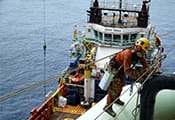Risks Associated with the Transit Processes
The transit business, being such a dynamic one, is open to several risks, such as:
- Cargo Theft: Poor security measures, such as insufficient supervision, less secure containers, or unsafe transportation routes, are easily an invitation for thieves.
- Logistic Risk: Transit routes can be affected by natural disasters, political issues or civil unrest. Poor backup planning and using only one transport route can worsen these problems.
- Accidents: Accidents can cause damage to the transport vehicle and its cargo.
Understanding the Impact of Theft Risks on Business
Theft risks can have severe financial consequences for an organization. Here's how they can affect a business's economic stability:
- Damage to reputation: When a business suffers theft, it affects its reputation in the market, making it seem unreliable or incapable of protecting its products.
- Operational delays: Theft can cause operational delays as businesses deal with inventory shortages, file police reports, conduct internal investigations, and manage insurance claims. These activities can slow down production, delay shipments, and disrupt overall business operations.
- Financial losses: Theft results in significant financial losses. Recovering stolen goods or finding immediate replacements can cause a serious economic burden on a business.
How Does Transit Insurance Reduce Theft Risks?
Marine insurance policies can be tailored to address specific risks. It can vary depending on whether you wish to insure your cargo or the ship. It can also vary based on the geographical needs of your cover.
So, here's how transit insurance covers risk -
- ITC A & ITC B: ITC stands for inland transit clause. This provides coverage for damage caused within the Indian border. So, ITC A covers all types of perils except rainwater damage and ITC B covers only basic accidental damages.
- ICC A & ICC B: ICC stands for international cargo clause. This provides coverage for damage caused all over the world. So, ICC A covers all types of perils except rainwater damage and ICC B covers only basic accidental damages.
You may also read: How Does Transit Insurance Safeguards Delivery Businesses?
Factors to Consider While Choosing Transit Insurance Policy for Theft Coverage
Like any other policy, theft cover can vary based on several factors. Here are some best practices to consider while opting for appropriate theft coverage:
- Choosing the Transit Route and Goods
The transit route impacts your risk exposure. By analyzing the route's crime rate, you can select the best insurance plan to effectively cover your goods in transit.
- Analysing Insurance Policy Terms
Choosing a cargo insurance policy that covers specific transit-related risks is key to preventing theft. While selecting the policy, take into account the limits of coverage, deductions, and theft exclusions.
- Choose a Reliable Insurance Provider
Partnering with insurance providers that offer coverage for transit-related theft risks is essential. Choose an insurer that can provide customisable insurance coverage. It will allow you to adjust the plan according to the value of goods or the growing crime rate on transit routes.
- Regular Evaluation
Frequently reviewing your coverage ensures it meets your business needs. The right insurance helps prevent theft during transit and protects your assets.
You may also read: 10 Things to Ask Your Insurance Agent about Marine Insurance
Example of How Transit Insurance Policy Can Protect Against Theft
Rahul is an Indian businessman manufacturing high-class electronics products like televisions and premium mobile phones. He received an offer to showcase some of his top innovations in Singapore and happily accepted the offer. So, he hires a reputed transport company to send the requisite items.
The transport provider accepted the offer and shipped the product via sea. Unfortunately, they lost track of the shipment and came to know that there was a pirate attack on the ship carrying Rahul's container. Pirates hijacked the ship and took most of the goods from the containers, one of which contained Rahul's electronic products.
However, Rahul had covered those goods under marine insurance, and since they were stolen, he raised a claim. After the inspection, the insurance company gave the claim the green light and provided coverage for the stolen goods according to the sum insured.
Conclusion
Transit Insurance Coverage for Theft protects companies against financial losses while keeping the business up and running all the time. Whether operating at a small scale or large scale, transit insurance plays a signature role in taking the coverage to the next level. Hence, selecting the appropriate insurance plan adds a crucial layer of protection, enabling seamless and hassle-free operations.
Learn more about Marine Insurance






















 Expert advice made easy
Expert advice made easy


